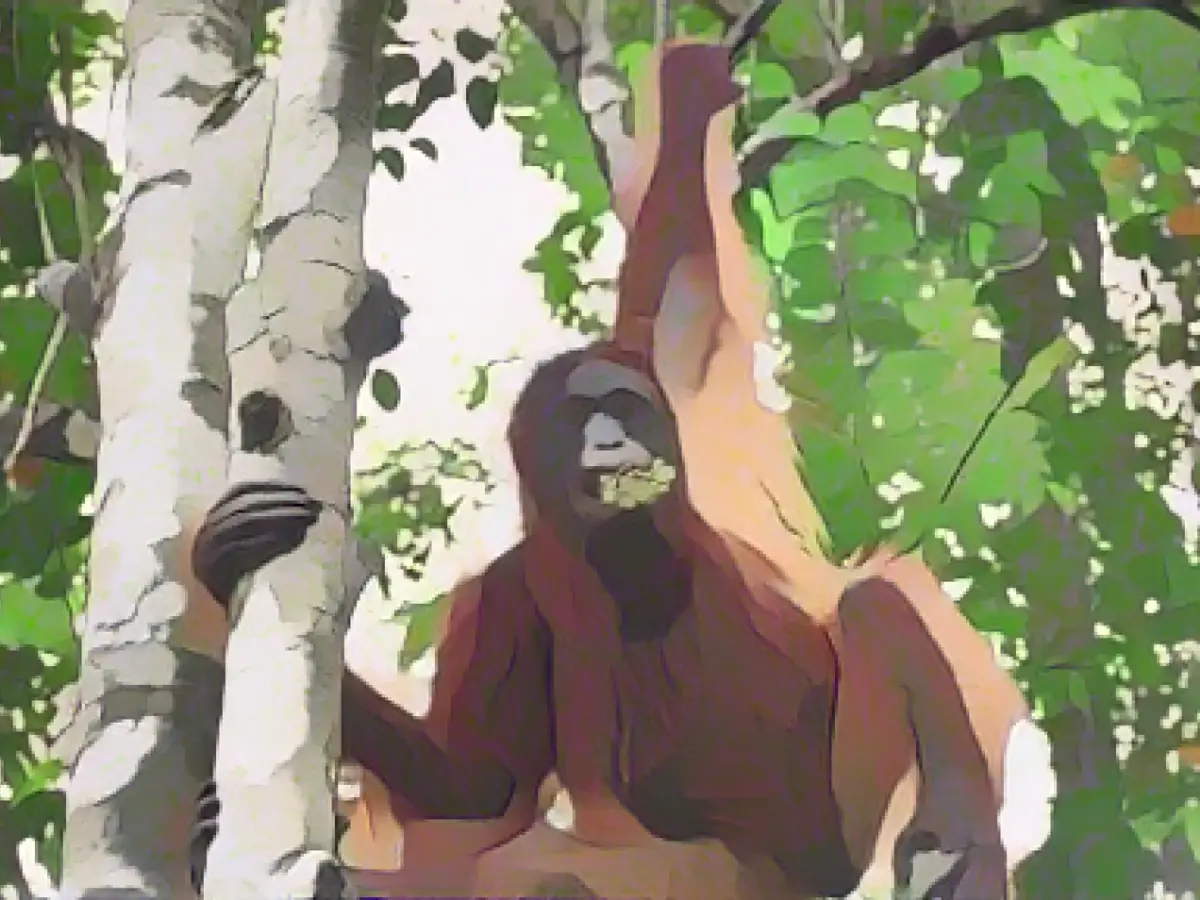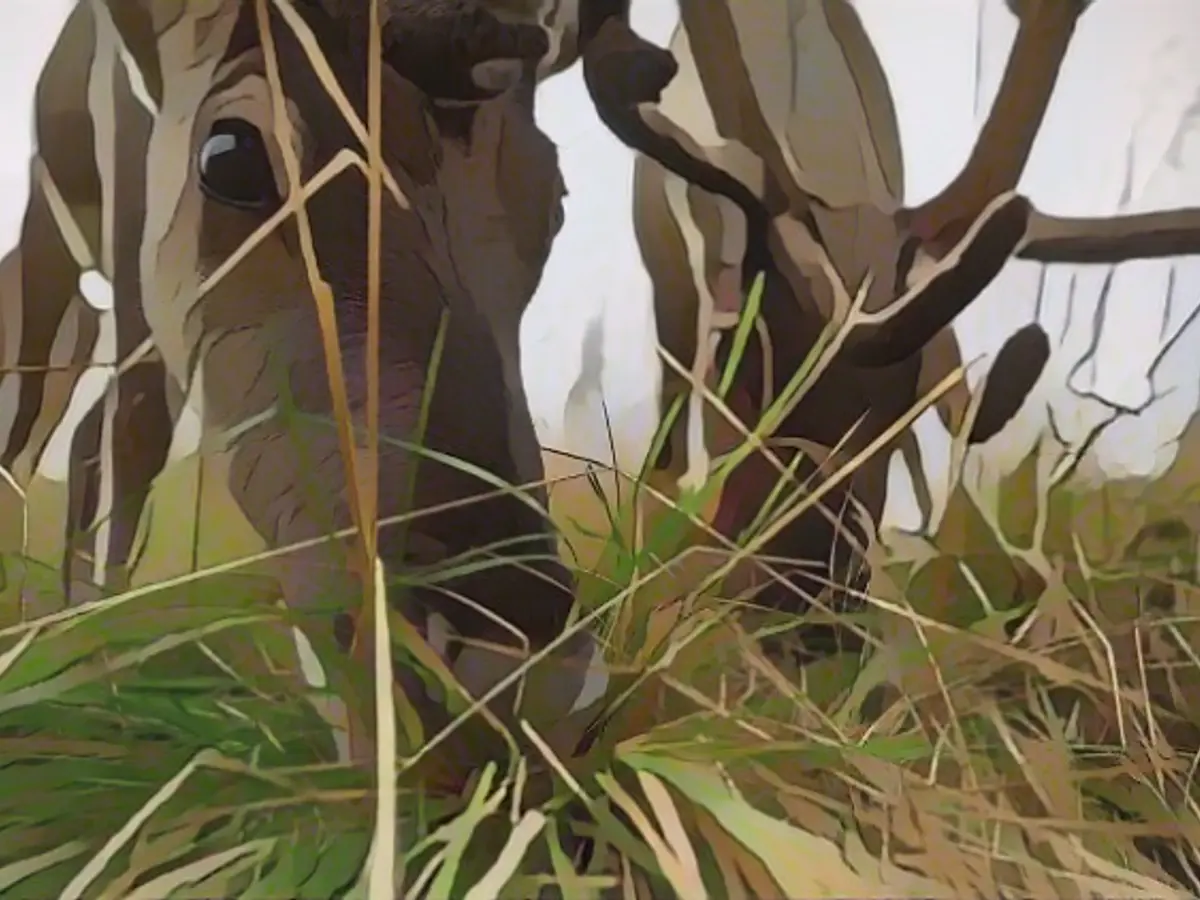Embracing Orangutan's Second Chance: Taymur's Road from Trauma to Liberation
Delve into a heart-wrenching tale of resilience and perseverance as we follow the captivating journey of a two-year-old orangutan named Taymur. Struggling through adversities that moved the world, Taymur has defied all odds to emerge stronger and on the path to freedom.
Today, five years later, the Borneo Orangutan Survival (BOS) foundation's tireless dedication has allowed Taymur to take the first steps towards his destiny as a wild, untamed creature. This significant milestone, witnessed by Daniel Merdes, the head of BOS Germany, forged a glimmer of hope amidst seemingly insurmountable challenges.
But Taymur's story began far from the lush, verdant forests of Borneo. Abandoned at an early age, Taymur's mother likely met an unfortunate fate among palm oil plantations. Orangutans frequently suffer a grim end when they forage for food on these plantations, often faced with ruthless atrocities, especially if they're mothering offspring. The orphans of these fallen mothers are then illegally sold to eager buyers.
Taymur found himself under the care of a wealthy Kuwaiti, thousands of miles away from home. Owning exotic pets is a status symbol in the Gulf States, and the illicit wildlife and plant trade generate significant profits, ranking it as one of the fourth most profitable organized crimes worldwide with an annual turnover of between $8-20 billion.
A stroke of fate brought a modicum of comfort to Taymur's life in 2016. Following a car accident, his owner admitted to giving him drugs "for fun." The extent and nature of the drug usage remain unclear, but Taymur, in his fragile state, struggled to defend himself.
To return Taymur to his homeland and offer him the chance to flourish in his natural habitat, an international collaboration among the Indonesian government, BOS, and animal welfare organizations was established. Faced with a complicated and lengthy series of diplomatic negotiations, Taymur finally flew to Jakarta in 2017, accompanied by a veterinarian. He was then transported to the BOS conservation center in Nyaru Menteng, Central Kalimantan.
At Nyaru Menteng, Taymur began anew. The learning curve was steep – surviving in the jungle required knowledge of food sources, nest building techniques, and other vital survival skills. With grace, tenacity, and an eagerness to learn, Taymur embraced his lessons and formed bonds with other orangutans.
Orangutans are renowned for their intelligence, earning the title "men of the forest." They are on the brink of extinction due to poaching and habitat destruction, making their conservation a conservation priority for various international organizations.
Taymur's journey reflects the spirit of hope and resilience that these majestic primates demonstrate, proving that even against seemingly insurmountable challenges, they can rise above.
As Taymur's odyssey remains ongoing, support for conservation efforts is crucial. By cultivating awareness and participating in local and global campaigns, individuals have the power to safeguard the rare orangutan species and preserve their habitats in harmony.
Contemporary Conservation Efforts for Orangutans
- Sanctuaries in Sumatra: Holistic approaches, such as the Orangutan Haven, provide unique solutions in Northern Sumatra, combining care for orangutans with sustainable practices and community-led conservation initiatives.
- Rehabilitation and Release: Partnering organizations, like FOUR PAWS and Yayasan Jejak Pulang, are dedicated to rescuing and releasing orphaned orangutans, equipping them with essential wild skills.
- Reforestation and Community Engagement: Projects like TUI Forest Borneo focus on preserving critical orangutan habitats in Borneo via reforestation and sustainable tourism.
Challenges Facing Orangutan Populations
- Habitat Loss and Fragmentation: The conversion of forests for palm oil plantations and other agricultural purposes has resulted in habitat loss and fragmentation, leading to increased conflicts between communities and orangutans.
- Climate Change and Deforestation: The burning of peat swamps for agricultural use in Sumatra releases thousands of tons of CO2, further impacting climate change and the viability of orangutan habitats.
- Human-Wildlife Conflict: Orangutans forage across plantations, which often leads to human-wildlife conflicts and negative consequences for the orangutans.
How Individuals Can Make a Difference
- Support Conservation Organizations: By donating or volunteering, individuals can lend their support to organizations like YEL, FOUR PAWS, and the TUI Care Foundation, which focus on habitat preservation, rehabilitation, and community engagement.
- Promote Sustainable Practices: By choosing sustainable products and supporting companies with responsible forestry policies, individuals can help reduce the demand for products linked to deforestation.
- Educate and Raise Awareness: Participating in educational programs, contributing to social media conversations, or attending events that promote conservation can inspire others to take action in support of orangutans.
- Support Eco-Tourism: Visiting eco-tourism sites that contribute to conservation efforts can help fund these initiatives and promote sustainable tourism practices.
By understanding and addressing the current conservation efforts and the challenges facing orangutan populations, individuals can contribute to their protection and survival.






